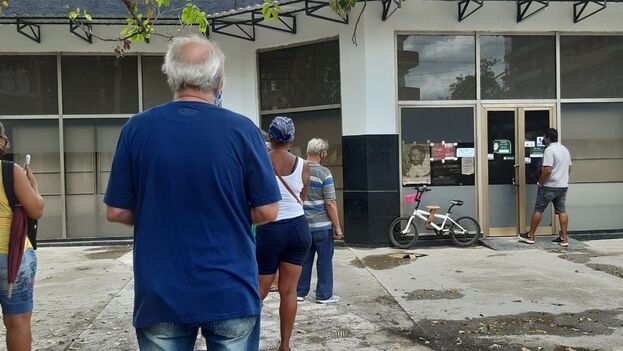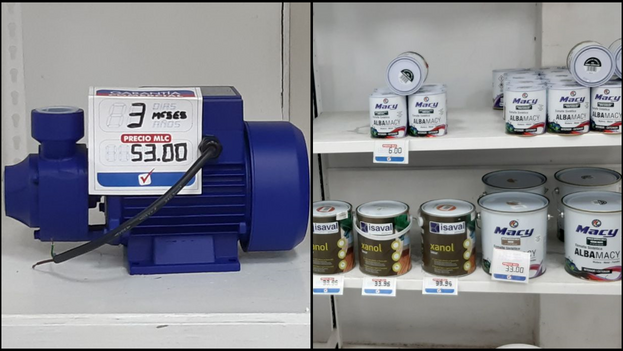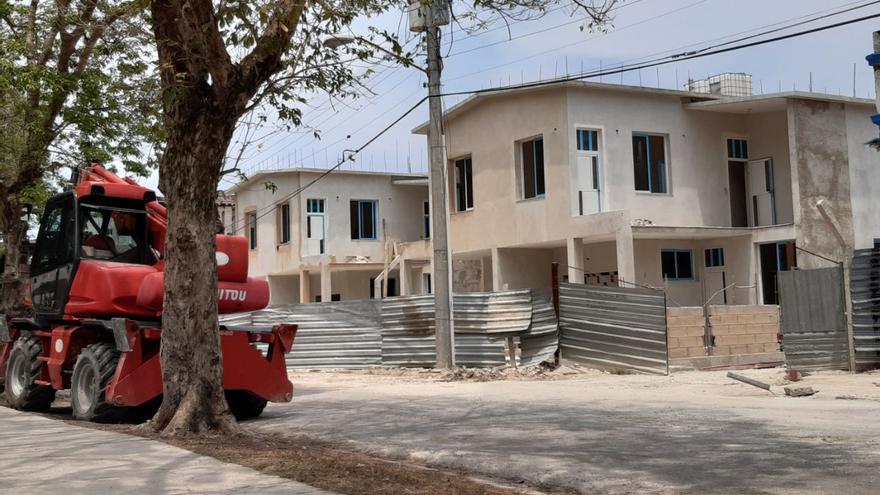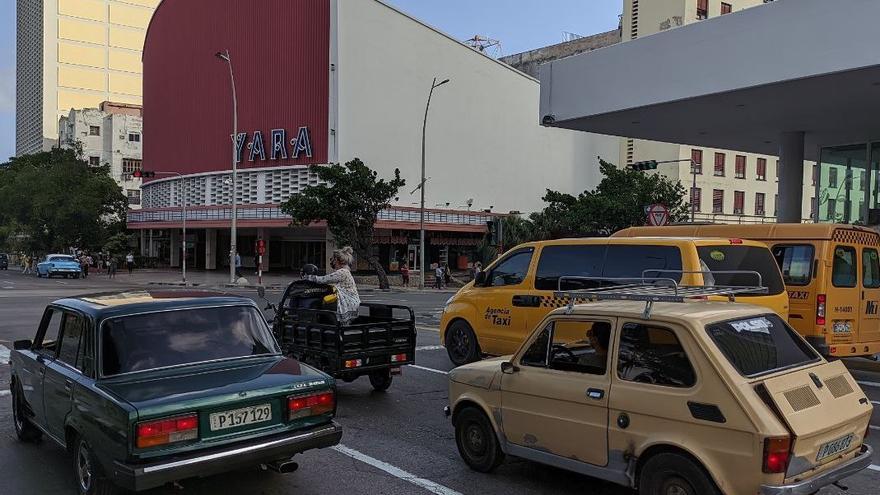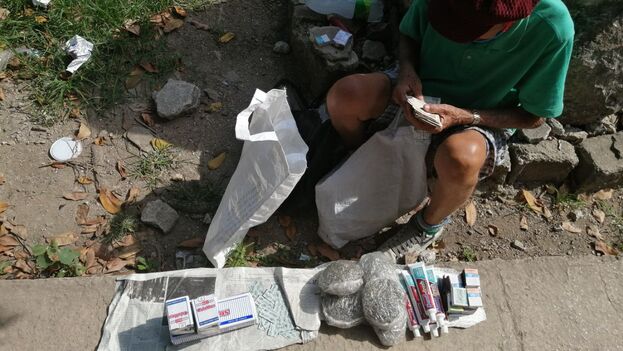
![]() 14ymedio, Natalia López, Moya, Havana, 3 June 2021 — On the island of cigars and cigar rag (cut tobacco), Cubans find themselves with the dilemma of acquiring packs of cigarettes on the black market or buying them in stores in freely convertible currency (MLC). In state stores and cafeterias, where this product is marketed in pesos, the shortage becomes more acute every day and huge lines get longer.
14ymedio, Natalia López, Moya, Havana, 3 June 2021 — On the island of cigars and cigar rag (cut tobacco), Cubans find themselves with the dilemma of acquiring packs of cigarettes on the black market or buying them in stores in freely convertible currency (MLC). In state stores and cafeterias, where this product is marketed in pesos, the shortage becomes more acute every day and huge lines get longer.
“I buy cigarettes from people who sell in my neighborhood because they are gone from the stores, but when I went to the Boyeros and Camagüey shopping center, there they were, all brands looking pretty, but in MLC. Tremendous lack of respect”, Jorge, a resident of the Havana neighborhood of Los Pinos, tells us. He adds that he should take advantage of the situation to quit smoking, but that it is quite difficult for him given the daily stress of living in Cuba.
Along with rum and coffee, two of the other symbols of Cubanness, smoking is no longer affordable for the pockets of the ordinary citizen. In addition, tobacco rose in price on January 1, with the start of the so-called ‘Ordering Task’*, but the rise was the least of the problems for some consumers who had seen the product disappear months ago. continue reading
In addition, tobacco rose in price on January 1, with the start of the ‘Ordering Task’, but the rise was the least of the problems
Many smokers have been forced to stop smoking their favorite brands. Those who preferred Hollywood, now have to turn to Rothman, which late last year replaced the former. But soon after, the Rothmans disappeared from the peso sales and can only be found at US$2.20 a pack. Consumers have had to opt for other alternatives, such as the green Popular or the H. Upmann, but now, those are also scarce and are only relatively easily found in sole proprietorship businesses for up to double their usual price.
Added to the dilemma of not finding the desired cigarettes is the complaint of many smokers about the poor quality of the product. The flavors have changed and sometimes the cigarettes come with little filler or scant glue, so the cork or filter separates from the rest. They also arrive with yellowish spots on the paper, a product of humidity, a sign of improper storage and handling.
“You may find either a stem of the tobacco leaf or a piece of plastic just as easily. It happened to me once, I noticed it because of the burnt cable stink, and almost called the fire department, but before I did, I realized that the smell was coming from the cigarette. After I performed the autopsy, I found a two-centimeters long piece of plastic. I still wonder how that ended up in the cigarette,” a Centro Habana barber told 14ymedio.
On the other hand, the few places where they carry the odd brand, especially “strong”, are hotbeds of desperate people trying to get the product at cheaper prices. “First I went to the Sylvain and there was only blue Popular, then I arrived at the Cupet, at Infanta and San Rafael Streets but they were very crowded, it took over 2 hours to get them and quantities were limited to purchases of 5 packs per person, which means that in four or five days I’ll have to wear out my shoes in search of the darn cigarettes again,” says a worker at La Quinta de los Molinos.
The mixed Cuban/Brazilian Company, Cigarrillos S.A., popularly known as Brascuba and founded in 1995, is the one that supplies stores in foreign currency and, although some prices continue to be unchanged, it has increased others.
At the beginning of last year, company executives declared that, in order to guarantee the constant flow of production and so that “there is no impact,” Brascuba had expanded its portfolio of suppliers and the main raw material, tobacco, came “directly from the Virginia project, in Pinar del Río, and that the company’s partners have contributed to its growth and improvement.” However, months later, reality tells a different story.
Faced with such a shortage, some people who are astute and have good memories, have resorted to the homemade manufacture of cigars, the so-called Tupamaros
Faced with such a shortage, some people who are astute and have good memories, have resorted to the homemade manufacture of cigarettes, the so-called tupamaros. They use the artisanal machines to roll, manufacture and produce cigarettes from different raw materials, such as sweepings or surplus that is usually discarded at the factories, or also by creating the filling from chopped tobacco leaves. Almost any paper can be used, as long as it’s a thin sheet, as long as the glue is a mixture of flour and water.
Francisco, a neighbor of the La Corona Tobacco Factory in Old Havana, performs very well in these tasks. He has dusted off his cigarette machines not used since the late 90’s and, after maintenance, he’s gotten down to business. “The situation has become very difficult, especially for us retirees,” he explains.
“Buying food is already complicated, so being able to smoke is so much worse, that’s why I remembered that I had the little machines to make cigarettes, so taking advantage of the shortage, I started production with what I can resolve. This way, I guarantee mine and sell to people from the neighborhood to recoup the investment and earn a bit of change, although sometimes I also trade cigarettes for sugar, chopped meat or whatever they offer me.”
*Translator’s note: The [so-called] ‘Ordering Task’ (Tarea ordenamiento) is a collection of measures that includes eliminating the Cuban Convertible Peso (CUC), leaving the Cuban peso as the only national currency, raising prices, raising salaries (but not as much as prices), opening stores that take payment only in hard currency which must be in the form of specially issued pre-paid debit cards, and others.
Translated by Norma Whiting
____________
COLLABORATE WITH OUR WORK: The 14ymedio team is committed to practicing serious journalism that reflects Cuba’s reality in all its depth. Thank you for joining us on this long journey. We invite you to continue supporting us by becoming a member of 14ymedio now. Together we can continue transforming journalism in Cuba.

